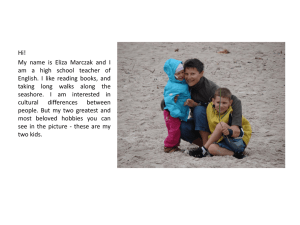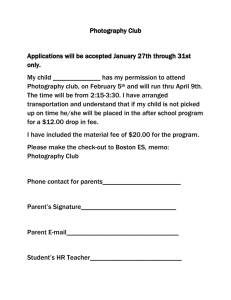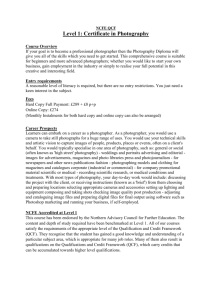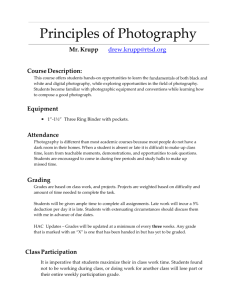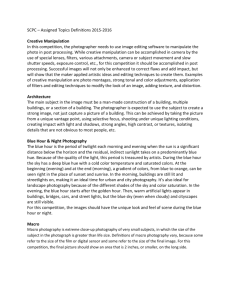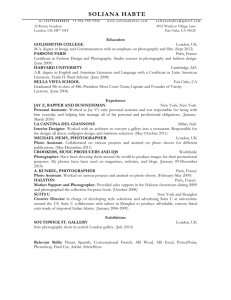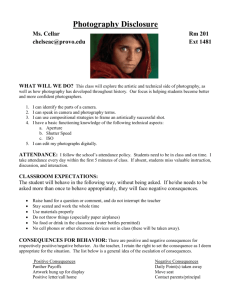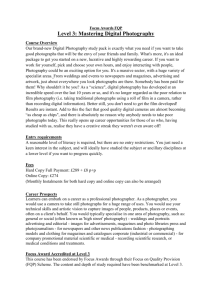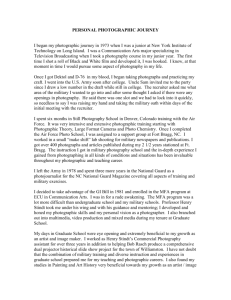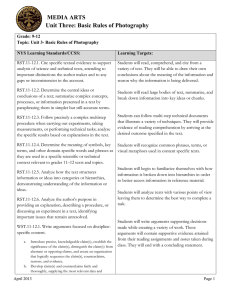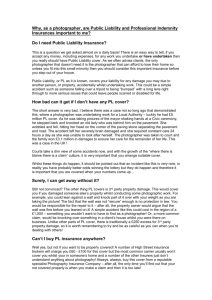Pre-arrival Information
advertisement
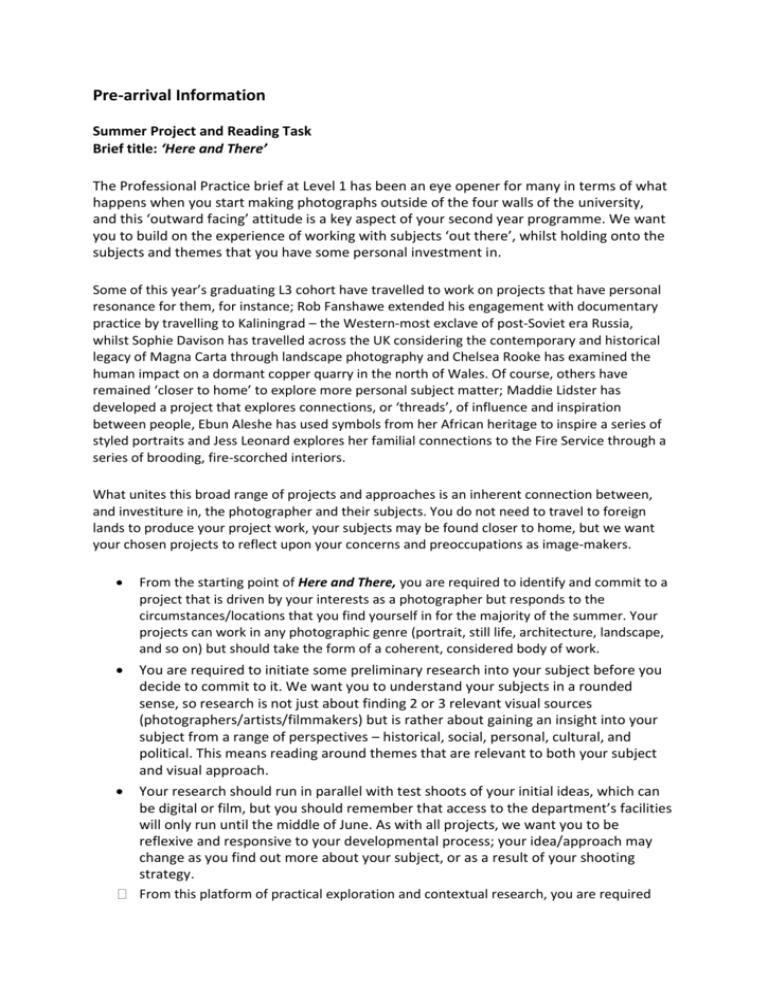
Pre-arrival Information Summer Project and Reading Task Brief title: ‘Here and There’ The Professional Practice brief at Level 1 has been an eye opener for many in terms of what happens when you start making photographs outside of the four walls of the university, and this ‘outward facing’ attitude is a key aspect of your second year programme. We want you to build on the experience of working with subjects ‘out there’, whilst holding onto the subjects and themes that you have some personal investment in. Some of this year’s graduating L3 cohort have travelled to work on projects that have personal resonance for them, for instance; Rob Fanshawe extended his engagement with documentary practice by travelling to Kaliningrad – the Western-most exclave of post-Soviet era Russia, whilst Sophie Davison has travelled across the UK considering the contemporary and historical legacy of Magna Carta through landscape photography and Chelsea Rooke has examined the human impact on a dormant copper quarry in the north of Wales. Of course, others have remained ‘closer to home’ to explore more personal subject matter; Maddie Lidster has developed a project that explores connections, or ‘threads’, of influence and inspiration between people, Ebun Aleshe has used symbols from her African heritage to inspire a series of styled portraits and Jess Leonard explores her familial connections to the Fire Service through a series of brooding, fire-scorched interiors. What unites this broad range of projects and approaches is an inherent connection between, and investiture in, the photographer and their subjects. You do not need to travel to foreign lands to produce your project work, your subjects may be found closer to home, but we want your chosen projects to reflect upon your concerns and preoccupations as image-makers. From the starting point of Here and There, you are required to identify and commit to a project that is driven by your interests as a photographer but responds to the circumstances/locations that you find yourself in for the majority of the summer. Your projects can work in any photographic genre (portrait, still life, architecture, landscape, and so on) but should take the form of a coherent, considered body of work. You are required to initiate some preliminary research into your subject before you decide to commit to it. We want you to understand your subjects in a rounded sense, so research is not just about finding 2 or 3 relevant visual sources (photographers/artists/filmmakers) but is rather about gaining an insight into your subject from a range of perspectives – historical, social, personal, cultural, and political. This means reading around themes that are relevant to both your subject and visual approach. Your research should run in parallel with test shoots of your initial ideas, which can be digital or film, but you should remember that access to the department’s facilities will only run until the middle of June. As with all projects, we want you to be reflexive and responsive to your developmental process; your idea/approach may change as you find out more about your subject, or as a result of your shooting strategy. From this platform of practical exploration and contextual research, you are required to push your idea forward to be resolved in a series of not less than 12 photographic images for presentation either as prints or digital projection during the first week of next year. As this may form a part of your developmental process for your first practical project of the second year, ‘Obsessions’, we want you to document your process fully in a format that has the capacity to augment your project work next year, either as a blog or in sketchbook form. Task 2: Student Texts for Reading Groups During this module you will also take part in a series of Reading Groups, but rather than be entirely led by the academic team we want you to select a piece of text that is relevant to your future project aims and intentions to be discussed within the group tutorials. Over the summer we want you to pick out a piece of writing that is substantial enough to be discussed within a reading group environment; i.e. a simple descriptive article on a photographer or photographic project will not necessarily provide the level of critical ‘bite’ for discussion. Look for critical reviews or thematic articles that you feel will give the group something to chew over. These sessions are not there to test you on your knowledge of the article under discussion (although having a good grasp of the content prior to the discussion will be helpful) but it is rather an opportunity for the group to discuss and share ideas in a constructive environment. Bring your chosen text along to the first session on the 22nd September so that we can copy the texts and hand them out to the group. Before you arrive it would be a good idea to begin the process of familiarizing yourself with some relevant texts, and below is a list that will introduce you to some useful preparatory reading. We will be directing you toward a broad range of books, journals and online research resources once you start, this list is intended to kick-start your creative engagement. Recommended Reading (alphabetical) Stephen Bull Photography, Routledge, 2009. Graham Clarke The Photograph, Oxford Paperbacks, 1997. Anne-Celine Jaeger Image Makers Image Takers, Thames and Hudson, 2010. Stephen Shore The Nature of Photographs: A Primer, Phaidon, 2nd edition, 2010 Susan Sontag On Photography, Penguin, 1979. Mary Warner Marien, Photography: A Cultural History. Lawrence King Liz Wells Photography: A Critical Introduction, 4th edition, Routledge, 2009. Equipment The Photography Department carries a wide range of technical resources and equipment, therefore we suggest that students do not invest in expensive equipment prior to joining the programme. We do recommend that all students back-up all of their practical work to their own hard-drive. It is suggested that students should purchase a robust portable hard drive with a minimum 500GB storage capacity. Many lecture and seminar rooms operate a Windows PC platform, whilst our studios are predominantly Apple Mac based, the technical instruction team will be happy to help with any formatting issues. Overseas Study Visit – Paris Photo 15 (11-15 Nov 2015) Each year the Photography Department organises an optional overseas study visit that is open to students from all three levels, this year we propose to visit Paris between the 11 th15th November to coincide with the Paris Photo 2015 festival. As well as the largest European festival of photography, the visit will also take in a number of smaller photography events (Offprint), as well as the range of independent galleries, museums and other cultural activities. The cost of the visit is estimated at £270, which includes the cost of travel and accommodation in a hostel close to the centre of the city – whilst many of the exhibitions will be free to enter or offer reduced concessions (entry to Paris Photo 15 will cost approximately €8 with concessions), subsistence costs are not covered. More details will be available during the induction week, when interested parties will also be asked to sign up to the visit and commit to a deposit of £50.

